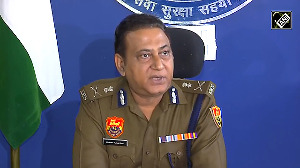The Maharashtra government is aware that the fake stamp paper racket has cost it several crores of rupees in revenue. It is also aware that people are waiting to know the fate of those official transactions carried out inadvertently using fake stamps or stamp paper. These include purchase of property and shares, filing of affidavits in courts, bank transactions... the list is long.
But the government does not seem to be in a hurry to find out the extent of the loss to the exchequer or clear doubts the people have about the entire episode.
| |||||||||||
The reasons for this lethargy are not known, but court cases in this connection have come in handy for ministers and officials to put off pesky mediapersons.
Maharashtra Revenue Minister Shivaji Patil Nilangekar admitted that 'the loss to the exchequer is yet to be calculated'.
"The state government will seek legal opinion on how to deal with agreements signed on fake stamp paper," Nilangekar said. "We are awaiting the court's decision. After that we will decide."
But no one in government is revealing which court case or order stops it from assessing the loss to the exchequer or considering ways to recover the amount.
Consumer organisations are clear that the government is to blame for the mess. Varsha Raut, organising secretary of the Mumbai Grahak Panchayat, said, "What happened is the government's fault. We will oppose any action to penalise the consumer."
It's almost a year since the scam was exposed, but the government is yet to find solutions to existing problems even as new ones are cropping up with each passing day.
Some of them:
In early 2003, the government had tried to contain the problem by passing an ordinance to amend the Bombay Stamps Act 1958. It had stayed the sale and use of adhesive stamps of value greater than Rs 100. Existing stocks of stamps and stamp paper were validated by authorised officers. Only authorised agents are now allowed to sell the stamps, and even this is being monitored closely. There are suggestions to allow only post offices to sell stamps and stamp paper.
The use of franking machines has gone up since the scam was exposed. But the ordinance (to amend the Bombay Stamps Act 1958) is valid for only one year. Why it has not been made into a law till now, only the government can tell, but is not telling.






 © 2025
© 2025